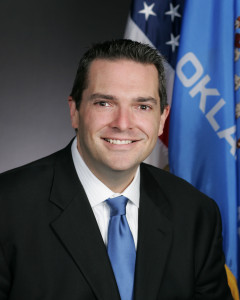OK budget agreement includes pension reforms

By Patrick B. McGuigan | Oklahoma Watchdog
OKLAHOMA CITY — Gov. Mary Fallin and legislative leaders Friday announced a 2015 fiscal year 2015 budget agreement that provides an $80 million increase for K-12 public education, a pay hike for some state employees, and $44 million for the Department of Human Services.
$ PRESSURES FROM OBAMACARE, BUT PENSION REFORM: State Sen. Clark Jolley, R-Edmond, fingered the Affordable Care Act for eating up roughly half of a spending boost for public education in the FY 2015 budget unveiled Friday. Leaders in both chambers promised pension reform would be a priority as the budget advances.
Total state spending will decline slightly under the plan, after reductions in many agency budgets.
What one legislator described as a “global accord” includes a commitment to put before both House and Senate the final version of an pension reform bill. If enacted, the pension measure would move the state toward long-term pension sustainability.
In an odd year, which saw government revenue increase, the budget framework Fallin negotiated with Sen. Brian Bingman, R-Sapulpa, and House Speaker Jeff Hickman, R-Fairview, includes “targeted spending cuts and a reconciliation of several state agency accounts to close a $188 million shortfall in funds certified for appropriations,” the leaders said in a joint statement,
Senate Budget and Appropriations Committee Chairman Clark Jolley, R-Edmond, said the Affordable Care Act is “greatly” if not entirely responsible for the state government’s increased costs for public employee health insurance.
Specifically, increased health insurance costs under ObamaCare will eat up approximately half ($40 million) of the projected “new money” for common schools.
The 2015 Oklahoma state government budget will be $102.1 million less (1.4 percent) than the 2014 budget, based on the estimates.
Jolley stressed, in a joint briefing with Senate Presient Pro Temp Brian Bingman, R-Sapulpa, the “shortfall” is not the result of poor economic performance.
Indeed, Oklahoma government has “higher income tax collections than ever before.” He said the reduction in money available for direct appropriation by the Legislature is a result of lower corporate income tax collections, and “money off-the-top” that is pre-designated for a variety of state programs, including a tuition scholarship program and tax credits.
Rep. Randy McDaniel, R-Oklahoma City, said major pension reform will advance anew in the Legislature beginning Monday.
McDaniel said the shift toward a defined contribution plan for new state government employees was part of what he called the “global agreement” that could bring the 2014 legislative session to a close within one week. Conservative fiscal analysts have said the shift away from “defined benefit” plans could bring the state’s largest pension plan into balanced in 12 to 18 years.
Hickman said in addition to $80 million in new money for public schools K-12, another $25 million will be drawn from the unclaimed property fund to finance property tax reimbursements to local school districts in the latter stages of abatements provided to the energy industry.
A total of $36.7 million in new money will be designated for government employee compensation, according to House Budget Chairman Scott Martin, R-Norman. Employees at the Departments of Corrections and Health and Human Services will see increases. And, state employees designated “the most underpaid” in an employee compensation survey will receive pay hikes under the proposed budget.
Martin said the boost to those “most underpaid” will be the first in a five-year plan to provide targeted pay increases for government workers.
Legislative leaders said say there is not majority support for the roughly $40 million in state taxpayer money that would be needed to continue work on the American Indian Cultural Museum in Oklahoma City, matching a reported $40 million in money not from the state.
There appears to be strong momentum, however, for a bond issue of approximately $120 million to finance state capitol repairs. Martin and Hickman said the latter would be structured to take advantage of low interest rates and would be completed within 10 years, saving as much as $100 million interest payments.
Contact Patrick McGuigan at pmcguigan@watchdog.org .







